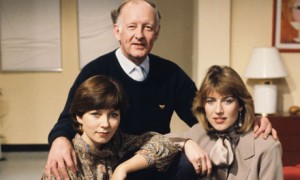
![]() This article titled "BBC1 Breakfast Time: 30 years of cereal TV" was written by John Plunkett, for guardian.co.uk on Thursday 17th January 2013 14.27 UTC
This article titled "BBC1 Breakfast Time: 30 years of cereal TV" was written by John Plunkett, for guardian.co.uk on Thursday 17th January 2013 14.27 UTC
It was exactly 30 years ago on 17 January that not a particularly expectant nation sat down to watch its first taste of breakfast television.
BBC1's Breakfast Time, launching two weeks ahead of its ill-fated ITV rival, TV-am, promised a new dawn in the history of the small screen.
What it delivered, along with Frank Bough, Selina Scott, Debbie Rix and Nick Ross on a sofa, was Francis Wilson forecasting the weather, Diana Moran – the Lycra-clad "green goddess" – getting the nation fit over their cornflakes, and Russell Grant, in a brightly coloured jumper, doing the horoscopes.
Richard Ingrams, writing in the Spectator, was not impressed. "There is no earthly reason why anyone of any intelligence would want to watch it," he wrote.
"If you look back you think, no wonder people were taken aback and thought it was vulgar," says Alison Ford, the incumbent editor of BBC1's early morning programme, now simply called Breakfast.
"It wasn't just hugely different to have proper programming in the mornings, it was a shock to the system."
Until then early morning viewers to BBC1 had to make do with test card or – if they were lucky – pages from Ceefax. There was always the radio, of course. Whatever happened to that?
Unfortunately for the programme's first editor, Ron Neil, the then BBC director general Alasdair Milne wasn't entirely happy with it either.
"In the first few weeks I was instructed by the DG to remove Russell Grant the astrologer, and insert a 'Thought for the Day' slot each morning," remembers Neil.
"I think he was under pressure from the governors. I declined and somehow survived." Grant, presumably, saw that coming.
"My Breakfast Time memories are very much of fear as to whether we could make it work," adds Neil.
"Remember there was quite a lot of resistance to TV in the morning. Many thought it a vulgar idea some even regarded it as immoral to have the television on in the morning. 'What's wrong with the radio in the morning …? It got us through the war.'
"I also thought that ITV with its Famous Five was likely to prove the more popular service … nice to be wrong."
The "Famous Five" was the much heralded TV-am lineup of David Frost, Anna Ford, Michael Parkinson, Angela Rippon and Robert Kee, who died last week.
Launching a fortnight after its BBC1 rival, TV-am was deemed too highbrow for a breakfast audience and never really recovered, its fortunes later saved by Greg Dyke and Roland Rat (but that's a different story) before it lost its licence in 1992.
Fast-forward three decades, and BBC1's Breakfast had an average weekly reach of more than 12 million viewers 2012, more than double the 5 million-plus who tuned into ITV's ill-fated Daybreak, which replaced TV-am successor GMTV in 2010.
Hard to imagine now, but ITV had the breakfast ratings lead over BBC1 10 years ago. Ahead in 2003 and 2004, BBC1 began to pull clear in 2005, establishing an advantage it has never lost.
Breakfast's weekly reach peaked in 2011 with 12.5 million viewers a week, around double the 6 million or so who tune into BBC Radio 4's Today every week.
Ratings slipped back in 2012, although its current editor, Alison Ford, denies it has anything to do with the Salford effect.
The programme moved out of London to the corporation's new BBC North HQ in April last year, a switch that led to the departure of presenter Sian Williams who preferred to stay in the capital.
"Things are different but in lots of ways they are the same," she says. "In terms of content and how the programme looks and feels clearly there are differences from 30 years ago but from pre-Salford says there are very few," she says.
On the difficulties of encouraging guests on to the breakfast sofa in Salford, as opposed to London, Ford says: "It has rarely been an issue. The notion that when we were in London we only interviewed people in London and not from Newcastle or Glasgow or wherever is not the case.
"In London we spent a lot of time trying to persuade people to come from all parts of the country, that is the same now.
There are opinion formers, report authors, politicians who clearly are based in London and many will travel. There are politicians who never travelled from Milbank to Television Centre [in west London, where it was previously based], of if they did very rarely."
Grant was back on the programme today with his horoscopes, a one-off. On BBC Radio 4's Today on Thursday morning Grant recalled walking into the studio for the first ever Breakfast Time. "The first thing that happened – I was wearing something pretty dapper, it wasn't that striped mohair multi-coloured rainbow jumper – I walked in and there had been things happening behind the scenes at the BBC and they threw the jumper at me and said 'put that on, you are now light entertainment'.
"I sat down and the very first person I interviewed was Harry Secombe and I did his proper stars and then I did the stars for everybody else and that really set the trend."
What were your memories of Breakfast Time? And what will the next 30 years hold for morning TV?
guardian.co.uk © Guardian News & Media Limited 2010
Published via the Guardian News Feed plugin for WordPress.
Comments are closed.